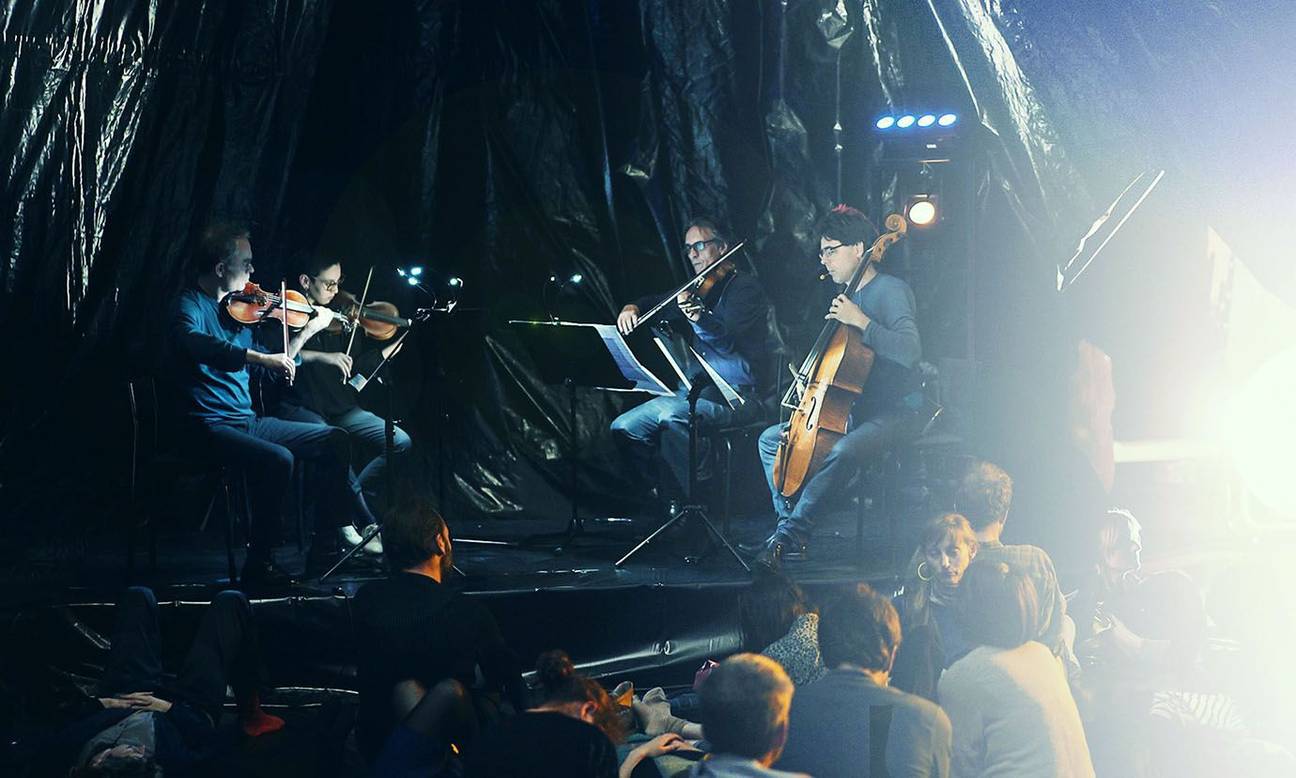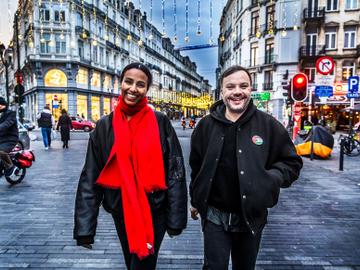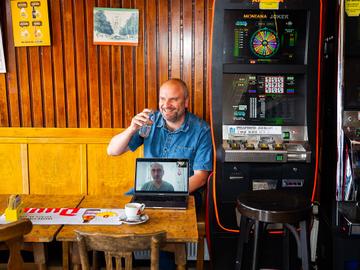Ictus is celebrating its 25th anniversary with a concert that spotlights the future of the world-renowned Brussels-based ensemble and contemporary music more generally. “We must stop wanting to be musicians from the 19th century.”

Ictus in concert.
25 years of Ictus: 'We are contemporary classical nephews of free jazz, noise, and rock'
Ictus is the living musical heritage of the flourishing performing arts scene in Brussels that seized on the fallow cultural landscape of the 1980s and began to shape an identity that garnered increasing international acclaim. The ensemble concretely emerged through a schism within Maximalist!, which provided the contemporary soundtracks for the first dance productions by Anne Teresa De Keersmaeker and Wim Vandekeybus.
“Are we going to perform contemporary music in a mainstream way? That was the major point of disagreement,” pianist Jean-Luc Plouvier tells us. Along with guitarist Tom Pauwels, Plouvier is currently artistic coordinator. “There was the radical faction, with people like Eric Sleichim and Peter Vermeersch who wanted to make amplified, physical music, not contemporary bullshit. And there were the moderates like Thierry De Mey, Dirk Descheemaeker, and me, who wanted to combine the two and who eventually founded Ictus, which was to perform more composed work.” Others were daunted by that double, ambiguous identity between contemporary and experimental, but for Ictus is has always been a leitmotif, an anchor even.
Another constant over the past quarter century of Ictus is an obsession to combine music with dramaturgy. Was that primarily inspired by Rosas, which is based a few metres away?
Jean-Luc Plouvier: We consider Rosas to be a school. Our shared daily meals in the canteen and philosophizing about life with dancers and P.A.R.T.S. students still makes us feel like we're on a campus.
Tom Pauwels: Thanks to the many joint productions, we started focusing more on the bigger picture, the lighting, the presentation… But we also developed our obsession for dramaturgy separately from Rosas. At a certain point it was no longer clear to me who was influencing whom. Our urge to communicate about what we were doing was likewise a reason to start developing alternative formats. We wanted to talk about contemporary music in a less didactic, more experience-oriented way. Our concert series One.Only.One and a number of Blind Dates ultimately resulted in the Liquid Room concept, in which we allowed the audience the freedom to find its place in the music. Performing music that was usually pedestalized in a relaxed setting was very liberating.
Did this urge to desacralize things not make it difficult for your audiences to pin you down?
Pauwels: We are sometimes rather hazy, but we nevertheless appeal to a broad audience that consists of theatre, dance, and music lovers of various ages.
Plouvier: That ambiguity is a game in itself, and it also developed historically. Contemporary music draws on two sources. On the one hand, there is the horizontal continuity of classical music, with the succession of Beethoven, Strauss, Schönberg, Boulez… On the other hand, there was the vertical shockwave of the 1960s. We are thus the nephews of free jazz, noise, and alternative rock.
Pauwels: You can just call it the difference between coming to listen to pieces by composers and coming to experience an Ictus concert.
Let us reinstate the generalist musicians from the 17th century. They still played multiple instruments, composed, and sang
Why do you opt for artistic directors who are also musicians?
Plouvier: In many ensembles, such as Musiques Nouvelles, ChampdAction, or Court-Circuit in France, the artistic director is a composer. We, on the other hand, wanted the artistic management to come from among the musicians.
Pauwels: I joined after the number of Ictus activities had doubled to about eighty per year, and because I had a complementary taste. What's more, with musicians as artistic directors, an ensemble belongs to nobody and everybody at the same time. That Ictus culture also motivates other musicians to play a bigger artistic role. For example, flautist Michael Schmid is curating our anniversary programme, gambist Eva Reiter will soon have more room to move, and Tom De Cock co-conducted Einstein on the Beach this year.
Why are you presenting new work by Michael Schmid at your birthday party?
Pauwels: Because he doubts his relationship with his instrument and thus also the reason why he ever found himself here.
Plouvier: Michael doesn't actually want to be a flautist anymore, but a performer. That is why he started a breathing choir practice. At Ictus, we think of this as an exercise in the future. In a certain sense, it aligns with my dream. We must stop wanting to be musicians from the 19th century. Let us reinstate the generalist musicians of the 17th century. They still played multiple instruments, composed, and sang.
We recently presented a production at Les Ateliers Claus with electronica by the Swiss composer Antoine Chessex. If a musician were to have asked us there where his microphone was, they would no longer have a place in Ictus. In the future, we want even more to embrace the homo universalis who reads, goes to see concerts and museums, who can mix, and who knows how to use a computer. The future is to the musician who stands at a crossroads. The most rewarding thing is that these cool musicians, who all appear to date from the pre-Beethoven age, are becoming increasingly popular. That is why I see the current crisis of contemporary music as an opportunity.
With the musicians themselves as artistic directors, the ensemble belongs to nobody and everybody at the same time
You mentioned a microphone, which is a seamless link to retelling the anecdote about the first time you met Steve Reich.
Plouvier: When he came into the studio, clarinettist Dirk Descheemaeker was fixing his bicycle. (Laughs) Everybody else had lost track of time and was still in the canteen. But nobody there recognized him immediately either. When it later turned out that we had not provided fifteen microphones for the rehearsals, which we wouldn't have been able to afford anyway, he shouted: “It is not possible! If you play a Beethoven symphony, you need double bass, no? Well, if you play my music, you need microphones, because they are part of my instrumentarium!” The reaction of our conductor Georges-Elie Octors was magnificent. “One moment,” he said, and at his instruction we played "Tehillim" flawlessly, even though it is rhythmically incredibly complex. But with Georges-Elie there, nothing frightened us. We knew that we weren't the best ensemble. We had never organized exams to attract new musicians – we recruited by skill. But rhythmically, we were unbeatable. After forty minutes, an elated Reich said: “Okay!”
Pauwels: And that is the precise piece that we will reprise in 2020 with a big string section!
Read more about: Muziek , Ictus Ensemble , Kaaitheater , contemporary classical




Fijn dat je wil reageren. Wie reageert, gaat akkoord met onze huisregels. Hoe reageren via Disqus? Een woordje uitleg.